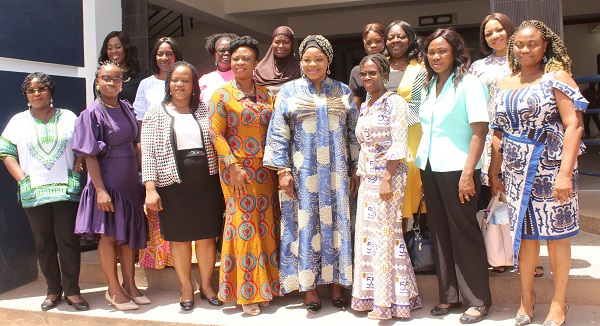Prioritise rest, build networks to balance work and family life’

Participants after the programme. Photo. Ebo Gorman
Women have been advised to strike a positive balance between work and family life in order to avoid the stress which comes with handling multiple tasks at a time.
They have been encouraged to prioritise rest, build networks, and delegate some of their duties where necessary to save time and energy.
According to Professor Abigail Mensah, majority of women were facing a lot of conflicts in trying to balance their work and family life, but could not voice it out due to the fear of losing their jobs.
She therefore urged organisations to make room for workers, especially, women to prioritise work-life balance by putting in place a work-family reconciliation system.
These were some of the fallouts of discussions held at a forum organised by the Business Administration Department in collaboration with the Women’s Association of the University of Professional Studies, Accra, UPSA recently.
The panel comprised Dr Peace Tetteh, Senior Lecturer, University of Ghana, and Professor Abigail Opoku Mensah, Director of the Centre for International Education and Collaboration (CIEC), UPSA.
Others were Dr Mercy Desouza, Industrial Psychologist, UPSA, and Mrs Shamima Muslim, Convenor, Alliance for Women in Media Africa (AWMA).
The forum which formed part of activities to commemorate this year’s Mother’s Day celebration was themed: ‘Working-Life Balance: A Mirage or a Possibility?’
Dr Peace Tetteh, sharing her thoughts, said prioritising rest, building networks and seeking help should be considered part of self-care.
She said women should, therefore, identify their source of strength which could be from exercise, meditation, reading the scriptures or listening to music to be able to balance work and family life effectively.
On her part, Dr Desouza noted that when work-life imbalances occur, it often leads to ‘’negative stress’’ which is characterised by palpitation and anxiety.’’
For this reason, she advised women to recognise issues that lead to work-life imbalance early and find possible means to address them.
According to her, the church needed to provide not only spiritual support, but social, financial, and informational support.
Mrs Shamima Muslim, in her submission, said a constant work-life balance was not certain because there would always be circumstances beyond ones’ control.
She urged men to complement the role of women at home although certain roles are considered the preserve of women.
By Portia Hutton-Mills















